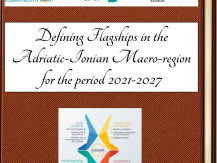EU Council Reaffirms Importance of Macro-regional Strategies in Strengthening Cooperation and Resilience
On 16th September 2025, the Council of the European Union formally adopted its Conclusions on the Fifth Report on the Implementation of EU Macro-regional Strategies (MRS), underscoring the crucial role these strategies play in promoting regional cooperation, resilience, and integration across Europe.
The report presented on 13th May 2025 by the European Commission, provides a comprehensive assessment of the ongoing implementation of the four EU macro-regional strategies—the EU Strategy for the Baltic Sea Region (EUSBSR), the EU Strategy for the Danube Region (EUSDR), the EU Strategy for the Adriatic and Ionian Region (EUSAIR), and the EU Strategy for the Alpine Region (EUSALP).
Recognizing the value of macro-regional strategies
The Council reaffirmed the valuable role MRS play in fostering cooperation, trust, preparedness, and resilience in the face of geopolitical and environmental challenges. It invites the participating countries to reinforce their political leadership and ownership of the strategies. As well the participating countries are encouraged to facilitate active engagement of civil society organisations, local communities, youth, academia and businesses in the implementation of MRS.
MRS as key tools for mutual learning and EU enlargement
The Council reiterated that MRS as an essential platform for candidate and neighbouring countries to engage with EU Member States on equal terms. This engagement supports the alignment of national legislation with the EU acquis, strengthens administrative capacities, and accelerates the enlargement process.
Greater focus on competitiveness and resilience
The conclusions call for a more pronounced focus on enhancing the competitiveness of the European economy. This includes fostering a just energy transition, ensuring resilience against global challenges, bolstering security, and addressing demographic changes that impact the region.
Reinforcing green, digital, and fair transitions
MRS are encouraged to continue contributing to Europe’s green and digital agendas while ensuring that these transitions are socially equitable. Ensuring a high quality of life for citizens, even as the region undergoes significant transformations, remains a key objective.
Embedding macro-regional priorities in EU programmes
The Conclusions noted the growing integration of MRS priorities into key EU funding programmes, particularly Interreg. The Council encourages continued efforts to embed macro-regional strategies into EU funding mechanisms throughout the entirety of the whole funding period to maximize their impact.
Enhancing communication and visibility
The Council also stressed the importance of reinforcing communication efforts to raise awareness and visibility about the strategies’ successes, which is essential to securing continued support as well as ensuring that all stakeholders are fully informed about their benefits.
The Council’s Conclusions serve as a crucial contribution to the ongoing evaluation of the EU’s macro-regional strategies, offering concrete guidance for future implementation.
For more details, the full document can be accessed here.
You might be interested in

EUSAIR flagships all summed up!

The Hellenic Republic assumes the Presidency of the EU Strategy for the Adriatic and Ionian Region (EUSAIR) (1 June 2024 – 31 May 2025)

3rd EUSAIR Annual Forum – CATANIA DECLARATION







